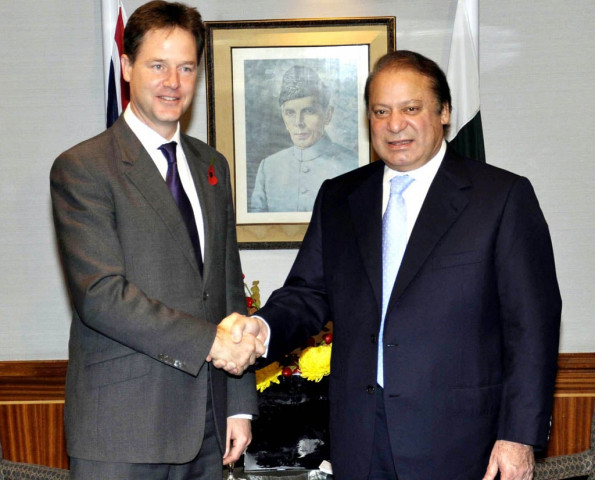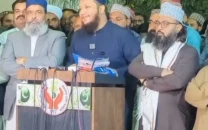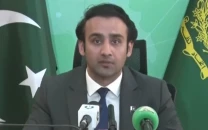Peace initiative: Govt begins TTP dialogue process, not actual talks
PM hopes talks will progress within constitutional framework though.

Nawaz also briefed Clegg on the recently promulgated Protection of Pakistan Ordinance. PHOTO: PID
Prime Minister Nawaz Sharif said on Thursday that the dialogue process with Tehreek-e-Taliban Pakistan (TTP) had started and voiced hope that it would progress within the constitutional framework of the country. A British government source confirmed this after the prime minister met British Deputy Prime Minister Nick Clegg in a central London hotel.
But officials in Islamabad clarified that no direct contact has yet been made with the TTP. “The formal talks are yet to take place but the process of dialogue has been started,” a senior official from the interior ministry told AFP. “We expect that the formal dialogue with Taliban will also take place very soon.”
A press release issued by the Pakistan High Commission stated that the meeting touched upon dialogue with Taliban, relations with India, energy situation and economic reforms agenda of the Pakistan government.
Talking about the Pakistan’s efforts to combat the menace of terrorism, the prime minister said that the government could not wait and see innocent people and members of the law-enforcement agencies being killed in the streets of Pakistan.

“The government is making its counter-terrorism forces and intelligence agencies fully capable to root out extremism from the country,” the prime minister said, according to the official statement.
The enhancement of the capacity of counter-terrorism forces was a part of different options to deal with extremism and terrorism, he added.
Nawaz also briefed Clegg on the recently promulgated Protection of Pakistan Ordinance adding that it was specifically prepared to deal with those terrorists who were waging war against people and the state of Pakistan.
The government has been trying to negotiate a peace settlement to end years of fighting, but the al Qaeda-linked group had previously said it was not open to talks. It had also said it would not disarm and would not talk to the government until drone strikes were halted and all its prisoners were released.
On Pakistan-India relations, PM Nawaz said that he had made sincere efforts to resolve all outstanding issues with India.
“We have made Indian bashing a non-issue in Pakistan but unfortunately, Indian politicians are still engaged in unwarranted bashing of Pakistan,” he said.
Talking about the reduction of energy subsidy, Nawaz upheld the government’s decision. He said although some segments of the society were not happy with the partial withdrawal of subsidy on electricity, the direction of the government was correct.
He said that during the next three to four years, new energy projects would start generating several thousand megawatts of electricity which would significantly reduce the demand-supply gap, as well as cut down the tariff.
British Deputy PM Clegg said that the British government was ‘full of admiration’ for Nawaz Sharif’s pro-active approach of reaching out to India before and after the elections.
He also assured that the United Kingdom would fully support Pakistan’s case for availing Generalised System of Preferences (GSP-Plus) in the European Union market. Clegg also appreciated the recently introduced economic reforms agenda by the Pakistan government as both sides agreed to solidify bilateral relations.
Published in The Express Tribune, November 1st, 2013.



















COMMENTS
Comments are moderated and generally will be posted if they are on-topic and not abusive.
For more information, please see our Comments FAQ